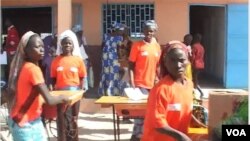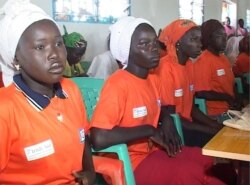At a women’s empowerment center in Cameroon’s northern town of Kousseri, on the border with Chad and Nigeria, a group of women are learning how to sew.
But this is no ordinary training center as these women have survived being forcibly married to
Boko Haram terrorists.
The Islamist militants abducted 18-year old Rumaitu Adjara, forced her to marry one of them, and then abandoned her after she had a baby.
At the center, Adjara has learned to repair dresses to earn money. She says it will not be easy for her to open a seamstress shop without funding. But if she is offered a sewing machine, she will repair dresses at home and door-to-door until she will have enough clients so she can afford to rent a shop.
Three other students at the center were forced to marry Boko Haram militants, who were killed fighting Cameroon’s military last year.
Cameroon’s military found the women in November near the Sambissa Forest.
Manager of the center Issa Abssatou says they have trained about 40 women since November, when the government ordered priority be given to Boko Haram victims. She says 20 of the women fled Boko Haram fighting in villages on Cameroon’s northern border with Nigeria a year ago.
She says they organize literacy classes before introducing young women and girls to computers, where they familiarize themselves with using the internet. Abssatou says they also teach them to type and arrange documents using the computer and to become seamstresses. She says some of the women they are training are now capable of creating their own businesses.
In Cameroon’s northern town of Garoua, 30 more women and girls are being trained at "Women’s Circle," a private empowerment center.
32-year-old coordinator of the center Frida Ngweseh says most of the women escaped from Boko Haram camps or villages where the militants are in control.
She says Cameroon’s government gives them grants and private donors also help the women get job training skills.
"They do not have anything and some of them have children to take care of. We want to make them understand that they are not alone in their fight, in the struggles, in the afflictions they are going through."
Abdoulaye Amoua is coordinator of Cameroon’s program for the socio-economic reinsertion of female victims of Boko Haram. She says there are about 200 women and girls getting training at the centers.
But Amoua says the $200,000 budget is not enough to buy the equipment and training for all the women to start their own businesses.
Amoua says her wish is for development partners and agencies to give them immediate assistance for resources to train the women to be independent. Contributing to the development of their families and communities, she says, would help prevent the temptation for them to return to Boko Haram camps.
The Nigerian Islamist militants often use the region’s high unemployment as a recruiting tool, offering jobs to those who join their fight.
Last year, Cameroon began distributing 60,000 goats and sheep to young Cameroonians in villages along the border to provide them with a basic income.
Boko Haram’s 10-year insurgency began in northeastern Nigeria but spilled across borders into Cameroon, Chad, and Niger, killing tens of thousands and displacing millions.
Cameroon says military offensives have reduced Boko Haram’s ability to launch large-scale attacks but, raids and abductions remain a threat, especially in villages along the border.





